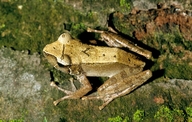|
Description
M 32-41 mm, F 38-45 mm. In general, similar to G. granulatus. Often with a characteristic broad head. Usually brown, without a continuous light stripe along upper lip, but instead some specimens with very contrasted white-yellow patches on the upper lip and in the tympanic region.
Similar species: G. redimitus and G. cornutus have a single vocal sac and two black tubercles between the eyes. G. granulatus has a bigger inner metatarsal tubercle and normally a light band along the upper lip.
Distribution and Habitat
Country distribution from AmphibiaWeb's database: Madagascar
Ambanizana, Ambatovaky, forest near Andranofotsy, Ilampy, Mananara, Nosy Boraha, Nosy Mangabe, Tampolo.
It has been recorded from sea level up to 700m (Andreone and Raxworthy 2008). Life History, Abundance, Activity, and Special Behaviors
Habits: Males call at night in rainforest, often far from water, at perches up to 3 m high on trees.
Calls: Unharmonious notes arranged in series.
Trends and Threats
This species is listed as near threatened because its Extent of Occurrence is probably not much greater than 20,000 km2, and the extent and quality of its habitat are probably declining, thus making the species close to qualifying for vulnerable. It is found only in protected areas found in Parc National de Marojejy and Parc National de Masoala, the Réserve Spéciale de Nosy Mangabe and the Réserve Spéciale d'Ambatovaky, and the Réserve de Biosphère de Mananara-Nord. It is threatened by the loss and degradation of its forest habitat due to subsistence agriculture, timber extraction, charcoal manufacture, invasive spread of eucalyptus, livestock grazing and expanding human settlements (Andreone and Raxworthy 2008). Possible reasons for amphibian decline General habitat alteration and loss
Habitat modification from deforestation, or logging related activities
Intensified agriculture or grazing
Urbanization
Subtle changes to necessary specialized habitat
Comments
Taken with permission from Glaw and Vences (2007).
References
Andreone, F. and Raxworthy, C. (2008). Gephyromantis leucomaculatus. In: IUCN 2008. 2008 IUCN Red List of Threatened Species. www.iucnredlist.org. Downloaded on 18 March 2009.
Glaw, F., and Vences, M. (2007). Field Guide to the Amphibians and Reptiles of Madagascar. Third Edition. Vences and Glaw Verlag, Köln.
Originally submitted by: Miguel Vences and Frank Glaw (first posted 2000-11-27)
Edited by: Catherine Aguilar (2009-04-07)Species Account Citation: AmphibiaWeb 2009 Gephyromantis leucomaculatus <https://amphibiaweb.org/species/4607> University of California, Berkeley, CA, USA. Accessed Nov 13, 2024.
Feedback or comments about this page.
Citation: AmphibiaWeb. 2024. <https://amphibiaweb.org> University of California, Berkeley, CA, USA. Accessed 13 Nov 2024.
AmphibiaWeb's policy on data use.
|
